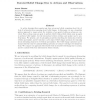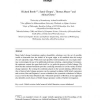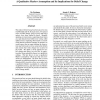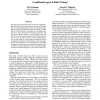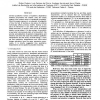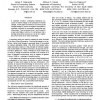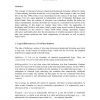134
Voted
JAIR
2011
14 years 9 months ago
2011
In action domains where agents may have erroneous beliefs, reasoning about the effects of actions involves reasoning about belief change. In this paper, we use a transition system...
116
click to vote
AI
2010
Springer
15 years 2 months ago
2010
Springer
Many belief change formalisms employ plausibility orderings over the set of possible worlds to determine how the beliefs of an agent ought to be modified after the receipt of a ne...
113
click to vote
UAI
1996
15 years 3 months ago
1996
The study of belief change has been an active area in philosophy and AI. In recent years, two special cases of belief change, belief revision and belief update, have been studied ...
114
click to vote
AAAI
1994
15 years 3 months ago
1994
The study of belief change has been an active area in philosophy and AI.In recent years two special cases ofbelief change, belief revision and belief update, have been studied in ...
100
click to vote
IJCAI
1997
15 years 3 months ago
1997
Several qualitative notions of epistemic dependence between propositions are studied. They are closely related to the ordinal notion of conditional possibility. What this paper pr...
109
click to vote
IJCAI
2001
15 years 3 months ago
2001
The Principle of Minimal Change is prevalent in various guises throughout the development of areas such as reasoning about action, belief change and nonmonotonic reasoning. Recent...
105
Voted
AAAI
2006
15 years 3 months ago
2006
We consider the iterated belief change that occurs following an alternating sequence of actions and observations. At each instant, an agent has some beliefs about the action that ...
142
click to vote
AAAI
2004
15 years 3 months ago
2004
A standard intuition underlying traditional accounts of belief change is the principle of minimal change. In this paper we introduce a novel account of belief change in which the ...
103
Voted
DAGSTUHL
2007
15 years 3 months ago
2007
The concept of relevance between classical propositional formulae, defined in terms of letter-sharing, has been around for a very long time. But it began to take on a fresh life i...
126
Voted
DAGSTUHL
2007
15 years 3 months ago
2007
Abstract. This paper makes a foundational contribution to the discussions on the very nature of belief change operations. Belief revision and pdate are investigated within an abstr...
